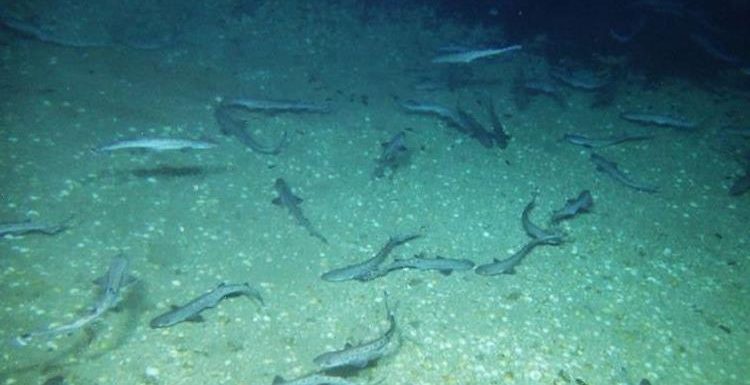
Basking shark shocks sailboat passengers off US coast
We use your sign-up to provide content in ways you’ve consented to and to improve our understanding of you. This may include adverts from us and 3rd parties based on our understanding. You can unsubscribe at any time. More info
An expedition led by the University of Haifa in northern Israel has exposed what may just be the largest shark nursery in the Mediterranean. Found near Tel Aviv, the nursery contains the largest collection of deep-sea shark eggs ever found. More importantly, the discovery may have wider implications for our understanding of how climate change impacts marine habitats around the globe.
Scientists have hailed their discovery as one of the most significant finds of marine habitats in Israel’s history.
Up until now, this part of the Mediterranean was considered to be something of a biological “desert”.
The Eastern Mediterranean is extremely sensitive to the effects of climate change.
Scientists can, therefore, gauge the region’s reactions to global warming to determine how other parts of the globe will react.
Dr Yizhaq Makovsky, one of the lead researchers at the Leon H. Charney School of Marine Sciences, said: “From a global marine research perspective, this discovery can have enormous implications.


“The Eastern Mediterranean Sea can be regarded as an early-warning system for what we can expect from marine environments across the world.
“Therefore, we believe that our discovery of a previously unknown deep-sea hotspot of life could provide crucial information for the sustainability and resilience of the marine ecosystem not only in the Eastern Mediterranean but also globally in other oceans.”
The expedition was aligned with the United Nation’s Sustainable Development Goals.
In particular, it was focused on “Life Below Water” – an initiative to save and protect marine environments and biodiversity.
Dr Makovsky said: “The deep sea is the Earth’s climatic capacitor, mitigating short-term changes.
Marine Biologist reveals how to redirect a tiger shark
“Once the impact of surface synoptic changes migrates to the deep sea, the entire climate of the Earth changes.
“The Eastern Mediterranean Sea experienced multiple climatic and anthropogenic changes at different time scales.”
The scientists were stunned when they stumbled upon the secret shark nursery.
Dr Makovsky called it “a shocking revelation to those who are familiar with the Eastern Mediterranean, which was thought of as an ocean desert”.
But according to the expedition’s findings, the shark nursery has existed in this part of the Mediterranean for thousands of years.


Dr Makovsky said it had been hidden away “under our noses” within earshot of Tel Aviv, one of Israel’s biggest cities.
He added: “It was hiding in plain sight, which highlights how little we know about the deep sea – not just off the coast of Israel, but around the world. This is a global challenge.”
The discovery also brings to a close a decade-long effort to map the seafloor.
The study was originally set into motion by famed oceanographer Dr Bob Ballard who partnered with Israel’s Professor Zvi Ben-Avraham.
The duo worked together to help promote deep-sea research in the southeastern Mediterranean – an area that had been previously neglected by scientists.
Dr Makovsky said: “This discovery closes the loop on a decade of exploration.
“When I first met Dr Ballard, only a decade ago, I became hooked on the deep sea.
“In Israel, we did not know much about deep-sea exploration back then.
“Since then University of Haifa’s Charney School transformed into the state-of-the-art centre for deep-sea research that it is today.”
Source: Read Full Article